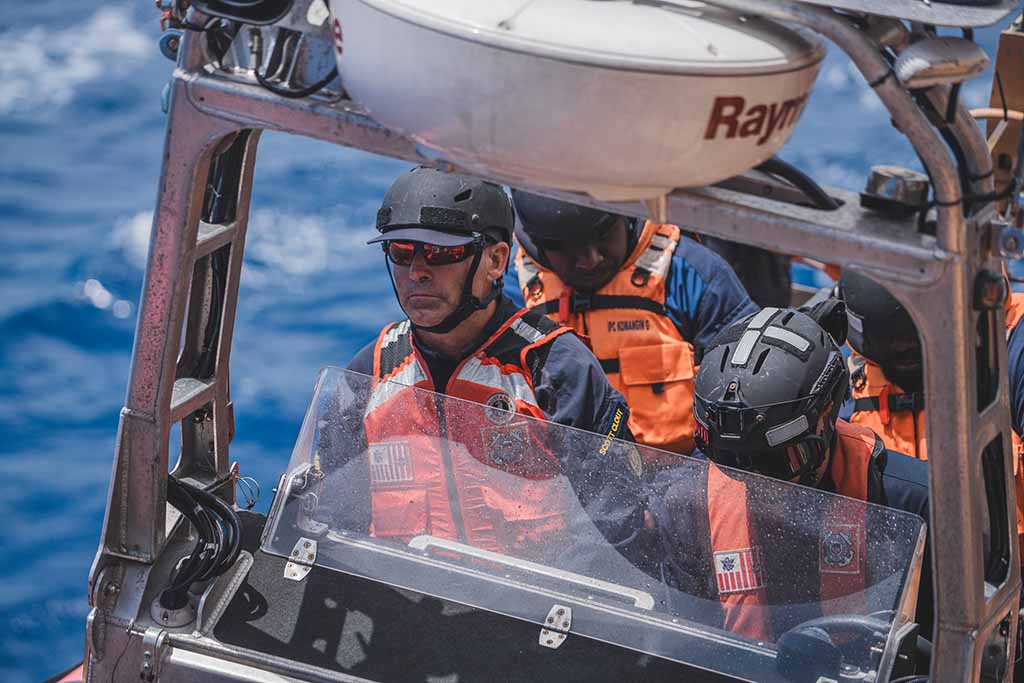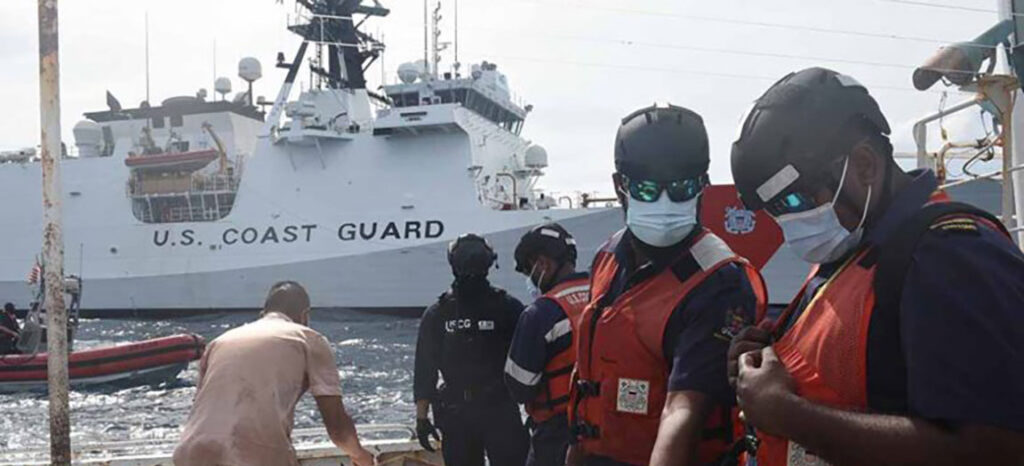Fijian law enforcement officers conduct a boarding of a China-flagged fishing vessel off the coast of Fiji as part of Operation Blue Pacific with the U.S. Coast Guard in 2022. IMAGE CREDIT: PETTY OFFICER 1ST CLASS NATE LITTLEJOHN/U.S. COAST GUARD
INDO-PACIFIC DEFENSE FORUM
Seven years after the United Nations General Assembly proclaimed June 5 the International Day for the Fight against Illegal, Unreported and Unregulated (IUU) Fishing, Indo-Pacific allies and partners continue to lead the battle against an illicit activity that the U.N. says has “major implications for the conservation and management of ocean resources, as well as the food security and the economies of many states, particularly developing states.” IUU fishing accounts for up to 14 million metric tons of catch each year and imposes an estimated annual economic toll of up to $50 billion worldwide, according to researchers.
“There is no spot on the globe that is immune from the theft of natural resources, and that’s what this is,” United States Coast Guard Commandant Adm. Linda Fagan told the Center for Strategic and International Studies, a Washington, D.C.-based think tank, in October 2023. “It’s stealing another nation’s natural resources or on the high seas … fishing in ways that are not sustainable and are inconsistent with agreed international law.”
The U.S. Coast Guard established the Illegal Unreported Unregulated Fisheries Center of Expertise in Hawaii in October 2023. It engages international partners to combat illegal fishing in the Indo-Pacific, promotes regional coordination and seeks to better equip partner nations to combat IUU fishing. The center also seeks to increase maritime domain awareness, exchange information, increase interoperability and share best practices.
Palau and the U.S., meanwhile, signed an expanded bilateral law enforcement agreement in August 2023, a regional milestone that lets the U.S. Coast Guard enforce regulations in the Pacific Island nation’s exclusive economic zone (EEZ) without having a Palauan law officer present. “This agreement helps Palau monitor our exclusive economic zone, protect against illegal, unreported and unregulated fishing, and deter uninvited vessels from conducting questionable maneuvers within our waters,” Palauan President Surangel S. Whipps Jr. said in a statement. “It’s these types of partnerships that help us work toward our common goal of peace and prosperity in the region.”
International law grants coastal states exclusive rights over the use and benefit of the natural resources, including fisheries, in their 200-nautical-mile EEZs. IUU fishing violates those sovereign rights. Vessels flagged to the People’s Republic of China (PRC), which has the world’s largest distant-water fishing fleet, are the leading perpetrators of IUU fishing, according to a December 2023 report by Poseidon Aquatic Resource Management and the Global Initiative Against Transnational Organized Crime.

The PRC also is the leading abuser of forced labor on fishing vessels globally, according to a November 2023 study by the Washington, D.C.-based Financial Transparency Coalition, which found that 25% of commercial fishing vessels suspected of abusing workers flew under the PRC flag. IUU fishing often relies on vulnerable workers and disadvantaged populations lured aboard under duplicitous employment arrangements and trapped for years in conditions where abuse, lack of medical care and malnutrition are prevalent. An estimated 128,000 fishers worldwide were trapped into forced labor aboard vessels, according to the U.N. International Labour Organization’s 2022
Across the Indo-Pacific, like-minded nations are collaborating to counter IUU fishing, including joint patrols by U.S. Coast Guard and partner agencies, as part of Operation Blue Pacific, which promotes safety, security, sovereignty and economic prosperity. Under the bilateral shiprider program, each nation’s military personnel and/or maritime law enforcement officers can ride aboard the other’s vessels and enforce laws within their respective waters and EEZs. The U.S. Coast Guard cutter Harriet Lane, for instance, conducted about 30 boardings with partner agencies within EEZs during a 79-day patrol that ended in April 2024.
Indo-Pacific participants include the Cook Islands, Fiji, Kiribati, Marshall Islands, Micronesia, Nauru, Palau, Papua New Guinea, Samoa, Tonga, Tuvalu and Vanuatu. The U.S. Coast Guard helps “create capacity, certainly in the Indo-Pacific, for nations to enforce and ensure their own national sovereignty,” Fagan said.

